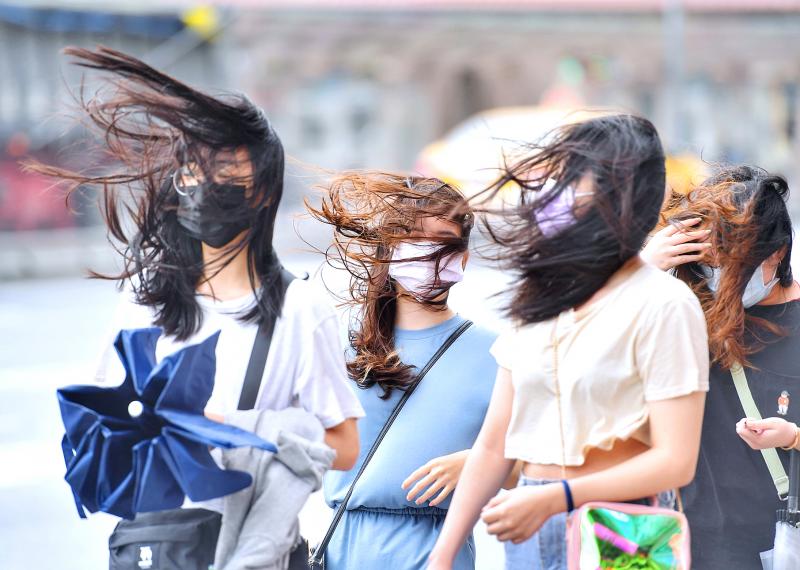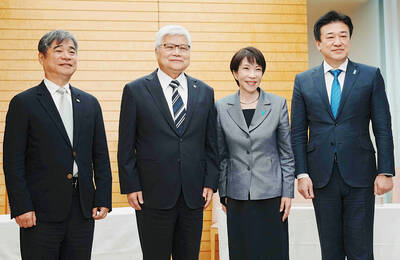Three to four tropical storms or typhoons are expected to hit Taiwan this year due to a weak La Nina effect in the northwest Pacific Ocean, the Central Weather Bureau (CWB) said yesterday, as typhoon season begins next month.
Taiwan’s typhoon season generally lasts from July to September, with most typhoons occurring in August.
Weather Forecast Center Director Lu Kuo-chen (呂國臣) told a news conference that a weakening La Nina is expected to have less of an effect on Taiwan.

Photo: CNA
“The climate simulation we conducted, and those conducted by other meteorological agencies around the world, showed that the number of typhoons that form in the northwest Pacific Ocean this year and the number of typhoons that would directly affect Taiwan are likely to fall within a normal range,” Lu said.
The average temperature over the next three months is expected to be normal to slightly warmer than usual, while rainfall is likely to be about the same as the average for this climate, he said.
On average, 20 to 25 tropical storms or typhoons are expected to occur in the northwest Pacific between now and December, three to four of which are forecast to affect Taiwan directly.
Only two tropical storms have so far formed in the northwest Pacific, fewer than the average of 4.3 for this climate, Lu said.
In a La Nina year, tropical storms or typhoons are likely to form close to Taiwan, Lu said.
“Once typhoons form off the east coast of the Philippines, they move toward Taiwan, or turn north toward Japan or Korea,” he said. “Because the typhoons travel a shorter distance before reaching shore, their intensity is likely to be normal.”
Two tropical systems are developing south of Taiwan, CWB senior weather forecaster Wu Wan-hua (伍婉華) said.
A low pressure system is lingering east of the Philippines, where tropical systems tend to develop, he said.
Another tropical disturbance in the South China Sea has become strong and is forecast to move northwest toward Hong Kong, while meteorological agencies in other countries have yet to agree on how the tropical system that is east of the Philippines will develop, Wu said.
“We will need to monitor the development of these two systems to determine how they will affect Taiwan,” she said. “There might be a Fujiwara effect if they are about 1,000km apart and comparable in strength, but it is still too early to tell.”
The tropical system in the South China Sea might be upgraded to Tropical Storm Chaba tomorrow, the bureau said, adding that from today, there would be a southeasterly wind bringing intervals of rain in its path.
As the low pressure system approaches the south of Taiwan on Friday, rain is expected on the east coast all that day, and in southern Taiwan and on outlying islands over the weekend, Wu said.
People in southeastern Taiwan and on the Hengchun Peninsula (恆春半島) should watch out for short bursts of intense rain, while people in northern and central Taiwan should brace for strong afternoon thundershowers, she said.

Right-wing political scientist Laura Fernandez on Sunday won Costa Rica’s presidential election by a landslide, after promising to crack down on rising violence linked to the cocaine trade. Fernandez’s nearest rival, economist Alvaro Ramos, conceded defeat as results showed the ruling party far exceeding the threshold of 40 percent needed to avoid a runoff. With 94 percent of polling stations counted, the political heir of outgoing Costa Rican President Rodrigo Chaves had captured 48.3 percent of the vote compared with Ramos’ 33.4 percent, the Supreme Electoral Tribunal said. As soon as the first results were announced, members of Fernandez’s Sovereign People’s Party

EMERGING FIELDS: The Chinese president said that the two countries would explore cooperation in green technology, the digital economy and artificial intelligence Chinese President Xi Jinping (習近平) yesterday called for an “equal and orderly multipolar world” in the face of “unilateral bullying,” in an apparent jab at the US. Xi was speaking during talks in Beijing with Uruguayan President Yamandu Orsi, the first South American leader to visit China since US special forces captured then-Venezuelan president Nicolas Maduro last month — an operation that Beijing condemned as a violation of sovereignty. Orsi follows a slew of leaders to have visited China seeking to boost ties with the world’s second-largest economy to hedge against US President Donald Trump’s increasingly unpredictable administration. “The international situation is fraught

Taiwan Semiconductor Manufacturing Co (TSMC, 台積電) plans to make advanced 3-nanometer chips in Japan, stepping up its semiconductor manufacturing roadmap in the country in a triumph for Japanese Prime Minister Sanae Takaichi’s technology ambitions. TSMC is to adopt cutting-edge technology for its second wafer fab in Kumamoto, company chairman C.C. Wei (魏哲家) said yesterday. That is an upgrade from an original blueprint to produce 7-nanometer chips by late next year, people familiar with the matter said. TSMC began mass production at its first plant in Japan’s Kumamoto in late 2024. Its second fab, which is still under construction, was originally focused on

GROWING AMBITIONS: The scale and tempo of the operations show that the Strait has become the core theater for China to expand its security interests, the report said Chinese military aircraft incursions around Taiwan have surged nearly 15-fold over the past five years, according to a report released yesterday by the Democratic Progressive Party’s (DPP) Department of China Affairs. Sorties in the Taiwan Strait were previously irregular, totaling 380 in 2020, but have since evolved into routine operations, the report showed. “This demonstrates that the Taiwan Strait has become both the starting point and testing ground for Beijing’s expansionist ambitions,” it said. Driven by military expansionism, China is systematically pursuing actions aimed at altering the regional “status quo,” the department said, adding that Taiwan represents the most critical link in China’s